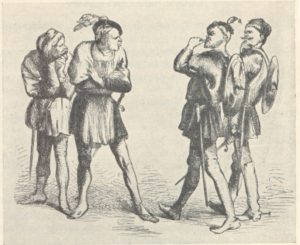 Challenge: Can we come up with “hooks” for Shakespeare?
Challenge: Can we come up with “hooks” for Shakespeare?
Normally when somebody mentions a hook today they’re talking about music, and that short repeated musical phrase (possibly not even words) that gets stuck in your head. Chances are when you hear the song again on the radio you don’t even recognize it the first few times until you hear the hook and you say, “Oh, yeah, this is that song, I love this song.” Know what happens, though? You recognize more of the song each time. You pay attention to the words. Before you know it, you can recognize it from the opening notes.
But the actual definition, at least according to Google, is
a thing designed to catch people’s attention.
So I’m wondering if we can’t come up with a hook for Shakespeare’s various plays. I saw a teacher complaining earlier that he’d given the students No Fear Shakespeare and yet still found himself having to translate that for them. I thought, “We’re doing this backwards. We hold the text up to be the Holy Grail and then we say let me make it simpler for you, let me make *that* simpler for you, let me make that simpler for you…” and all the materials are in that context of “Here’s how far removed you are from the actual good stuff.”
Let’s change the perspective. Can you reduce Hamlet down to a single sentence? I don’t want to summarize all the elements of the play. What I want is the students’ attention. I want them saying, “Sounds interesting, tell me more.”
I have this image like something out of a movie, the harried English teacher walking down between the desks while the kids sit on their phones, throw paper airplanes, and generally ignore him. The teacher is holding a copy of the complete works. He gets to his desk, turns, and slams the book down on his desk to get their attention. And he says … what?
Sure, he could go with, “Two households! Both alike, in dignity. In fair Verona where we lay our scene.” And if you’re like me lightning bolts shoot up your spine because that happens every time. But he doesn’t have a classroom full of Shakespeare geeks, and he needs to hook their attention some other way.
“Girl meets boy at party. Two days later they’re both dead.”
“Hamlet’s dad is gone and he wants to kill his step dad.”
“The only person that knows Macbeth just killed his boss is Macbeth’s wife, because she told him to do it.”
“Everybody knows Beatrice and Benedick love each other, except Beatrice and Benedick.”
As I write these I realize it sounds like click bait, but I don’t want to call it that. Clickbait implies trying to trick the user into looking under the covers for something that’s not really there. But everything I said above is true. I *want* my students to be interested in what happens next.
Anybody else got some good ones? The goal is to have a list of great starters that any teacher of Shakespeare could use to kick off a new lesson.

 Ok, a site called Art of Manliness offers up an article entitled, “
Ok, a site called Art of Manliness offers up an article entitled, “ Without Tybalt, would there be a Romeo and Juliet? My preferred interpretation of the “ancient grudge” is that it’s on its dying days, if not for Tybalt single-handedly keeping it alive.
Without Tybalt, would there be a Romeo and Juliet? My preferred interpretation of the “ancient grudge” is that it’s on its dying days, if not for Tybalt single-handedly keeping it alive. Challenge: Can we come up with “hooks” for Shakespeare?
Challenge: Can we come up with “hooks” for Shakespeare? If you’re a geek in the more traditional sense of the word, sometimes you look at the works of Shakespeare as one big text file and say, “Ooh, let’s look for patterns.” If you were to take a course on natural language programming, chances are very good that one of the first lessons will be in parsing Shakespeare for what are called n-grams, or “phrases of N words that always appear together.” This is how autocorrect works, it looks at what you’ve already written and then says, “Statistically, what do I think is typically the next word?”
If you’re a geek in the more traditional sense of the word, sometimes you look at the works of Shakespeare as one big text file and say, “Ooh, let’s look for patterns.” If you were to take a course on natural language programming, chances are very good that one of the first lessons will be in parsing Shakespeare for what are called n-grams, or “phrases of N words that always appear together.” This is how autocorrect works, it looks at what you’ve already written and then says, “Statistically, what do I think is typically the next word?”